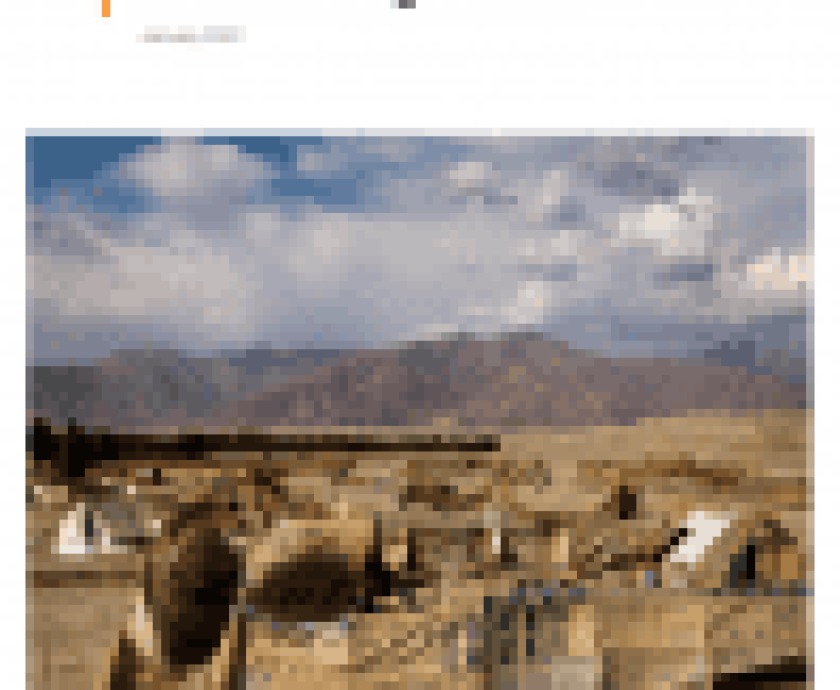A police officer faces protesters in Nepal’s Terai region in September 2015.
© 2015 Private
(New York) – The government of Nepal should make public, as pledged, the report of the commission that investigated deadly violence involving police and protesters in 2015, Human Rights Watch said today. Donors, including the United Kingdom and United States, which provide training and other security assistance to Nepal, and the United Nations which uses Nepali police on field missions, should seek to make sure that the government upholds the report’s recommendations on transparency and accountability in law enforcement.
The report covered several weeks of violence in the southern part of the country during the final stage of drafting Nepal’s new constitution. Leaks to the media in recent weeks show that it contains crucial information to provide justice to the victims and could help prevent similar violence in the future. When he presented the report to the government in December 2017, the commission chair, Girish Chandra Lal, a retired Supreme Court justice, said that it included the cases of 66 people killed during the violence, including 10 policemen.
“Selective leaks in the media are causing confusion about the findings. The government should instead release the full report and explain how it will respond to the recommendations,” said Meenakshi Ganguly, South Asia director. “Victims and their families placed their faith in government commitments to an independent investigation, and there can be no possible justification for keeping the findings under wraps.”
The commission investigated incidents across the Terai, including the actions of protesters and security forces’ responses. Trials have gone forward for the killings of police officials, although witnesses told the commissioners that the real culprits had not been arrested.
Security forces did not fully cooperate with the commission. However, based on media articles describing leaked material, the commission found that the police “did not fulfil their important duty” to protect members of the indigenous Tharu community from mob attacks. It also concluded that the use of lethal force against protesters in the eastern Terai region could not have occurred “without the direction and orders from the local administration.” The commission said that the killing of bystanders and protesters involved excessive use of police force.
Human Rights Watch investigated 25 of the killings documented in the commission’s report, with similar findings. Human Rights Watch found that during protests in Tikapur, Kailali district, eight police officers were beaten and burned to death on August 24, 2015. Another police officer was dragged from an ambulance and killed in Mahottari district on September 11. Human Rights Watch also documented numerous instances in which police opened fire indiscriminately or without justification, killing protesters and bystanders.
In Kalaiya, Bara district, witnesses described watching a senior police officer shoot dead an injured protester, Hifajat Miya, 19, as he lay on the ground on September 1. The incident was also recorded on video, obtained by Human Rights Watch. In the nearby city of Birgunj, on the same day, police opened fire into a hospital. Witnesses said that police in Janakpur also opened fire, using live ammunition against protesters. Police dragged Nitu Yadav, 14, from where he was hiding in the bushes and shot him dead as he lay on the ground, while neighbours looked on from nearby buildings. Another protester, Sanjay Chaudhary, who was hiding nearby, was fatally shot in the back moments later as he tried to flee.
The Nepal police receive substantial donor assistance from the UK and the US, partly with the objective of improving their human rights record. The Nepal police also contribute officers to UN missions, which involves human rights vetting of personnel. The commission’s report may contain material that the Nepal government needs to disclose to credibly maintain these relationships.
The commission was set up in September 2016, and its six-month tenure was extended twice. In addition to Lal, the other members of the commission were Deputy Attorney General Surya Koirala, advocate Sujan Lopchan, former Assistant Inspector General of Police Navaraj Dhakal, and Home Ministry Joint Secretary Narayan Prasad Sharma Duwadi. They investigated 3,264 complaints registered with the commission.
“The commission, composed of highly respected senior officials, struggled to produce independent findings despite a lack of cooperation from state authorities, and Nepal needs to show that it takes the findings about human rights violations seriously,” Ganguly said. “The Nepal police’s international partners should also review the findings and satisfy themselves that basic human rights commitments are being upheld.”




